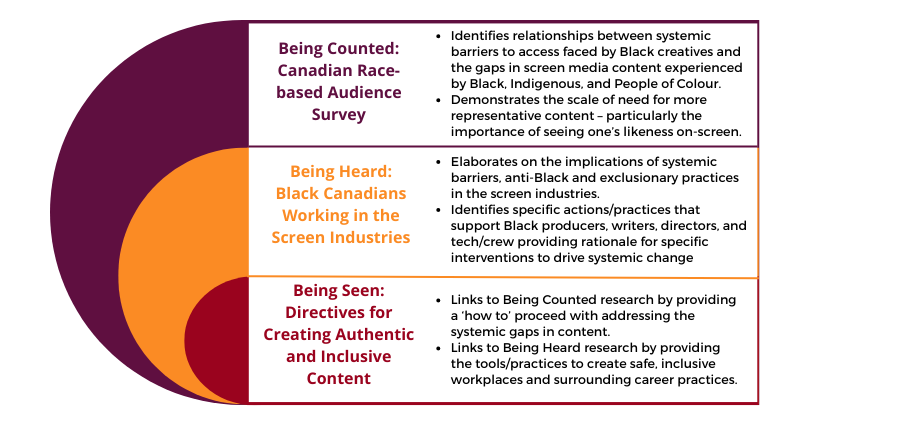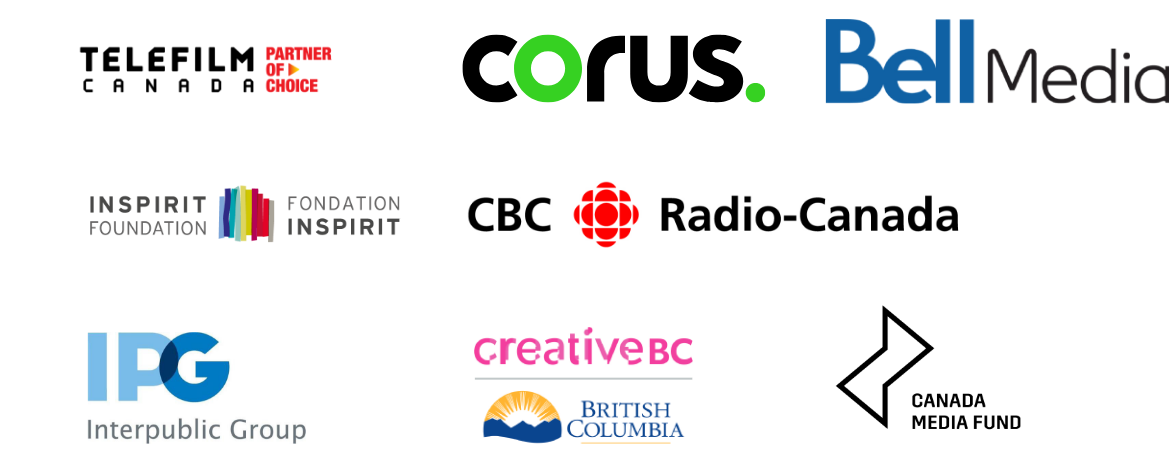ABOUT BSO
The Black Screen Office (BSO) arose from a letter requesting a meeting with Stephen Guilbeault, Minister of Canadian Heritage, to discuss how we can work together to eliminate the unacknowledged anti-Black racism in the Canadian screen industries.
Our goals are to make Canada’s screen industries practices and policies equitable and free of anti-Black racism; to work collaboratively with decision-makers to develop tools and strategies that enable system-level engagement and accountability; and to empower Black Canadians working within the screen industries to thrive and share their stories.
The BSO’s Being Counted: Canadian Race-Based Audience Survey is one of three ground-breaking research projects by the BSO designed to accelerate system change towards equity, inclusion and authentic content creation across Canada’s screen industries. The three research projects provide valuable empirical data and new insights into the relationship between Canada’s screen industries and the country’s Black communities, whether they work within the industries or consume their content.
RESEARCH CONNECTIONS
Being Counted: Canadian Race-based Audience Research looks at the screen media preferences and consumption habits of Black, Indigenous, and People of Colour audiences— three historically underrepresented communities. Collectively, these groups represent a significant untapped audience but their unique profiles and habits are lost in traditional audience surveys by being rolled into the “general population” results. With this research, BSO makes these audiences visible and uncovers the role onscreen representation plays in influencing consumption habits. The survey’s insights can help inform changes to programming as well as changes to traditional audience research methodologies to accurately reflect the preferences of all Canadians.
Being Seen: Directives for Creating Authentic and Inclusive Content shares the perspectives of 400 screen industry professionals and members of the viewing public—both adults and children—who are Black, People of Colour, 2SLGBTQIA+, and/or People with Disabilities about their representation in screen products and what could be done to improve it. Their perspectives are outlined in a Core Themes report that examines the common themes shared across all communities interviewed, and in five community-specific reports that dive more deeply into portrayals and entertainment desires of In addition to these insights, the report provides a series of practical directives specifically to support creators, producers, broadcasters, digital platforms, streaming services, funders, distributors, casting agents and industry associations to commission, create and assess authentic content within Canadian screen-based media. Read the reports here.
Being Heard: Black Canadians in the Canadian Screen Industries examines the professional experiences, education, interests, needs, pathways to access, and participation in Canada’s screen industries by existing and aspiring Black producers, writers, directors, and tech/crew. One of the key themes from the Being Seen research was the need for more Black participation at all levels of the creative process to ensure productions achieve authenticity. Being Heard provides new insight into the presence and experience of Black screen industry professionals. From this research, we can identify gaps and barriers, amplify the approaches and strategies that have worked to foster Black success, and develop evidence-based interventions that are most helpful to Black creatives navigating the sector. Learn more here.
Through these three research tools, BSO is developing a comprehensive picture of Canada’s screen industries and the actions required to ensure greater equity, inclusion and authenticity on- and off-screen.

ACKNOWLEDGEMENTS
This research was commissioned by the Black Screen Office.
The research was conducted by IPSOS.
The report was written by Quilin.

We are greatly appreciative of the participants who took the time to respond to the online survey and participate in the qualitative interviews.
FUNDING PARTNERS
This study was made possible in part by generous contributions from the following organizations:

Any opinions, findings, conclusions, or recommendations expressed in this material are those of the author(s) and do not necessarily reflect the views of the project funders or of the Government of Canada. The author(s) are not mandataries or representatives of the funder or the Government of Canada, and the funders and the Government of Canada are in no way bound by the recommendations contained in this document.